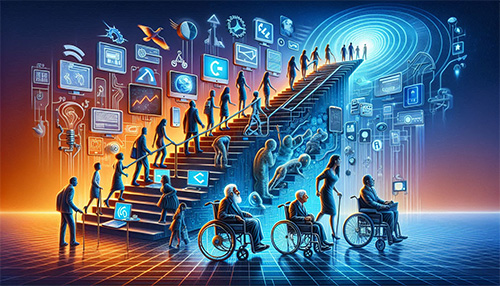In the ongoing pursuit of online equality for individuals with disabilities, there is a critical need to reassess current advocacy strategies through the lens of human rights and social justice. This article delves into the multifaceted challenges faced by disabled individuals in accessing the internet, particularly in technologically advanced societies like the United States.
The Evolution of Disability and the Internet
The evolution of the internet has transformed daily life, offering unprecedented opportunities for education, employment, and civic engagement. However, inherent barriers persist, hindering access for approximately one billion people globally who live with disabilities. Shockingly, statistics reveal significant disparities in internet usage and quality of access among disabled and non-disabled populations.
The Impact of Inaccessibility
Key barriers include inaccessible web designs, costly assistive technologies, and a lack of compatibility with assistive devices. Despite existing legal safeguards and professional standards, such as the U.S. Section 508 guidelines and WCAG 2.0, enforcement remains inconsistent, perpetuating inequality in digital spaces.
Redefining Accessibility as a Human Right
To address these challenges effectively, it is crucial to redefine online accessibility as a fundamental human rights issue. By framing accessibility within broader human rights frameworks—such as the Universal Declaration of Human Rights—advocates can strengthen the moral imperative for inclusive digital environments.
Conclusion
This approach not only emphasizes the ethical obligation to ensure equal access but also integrates accessibility into international and national standards, enhancing efforts to achieve true online equality. By fostering a more inclusive digital landscape, we can empower individuals with disabilities to fully participate in society, thereby advancing the principles of equity and social justice for all.
References
Jaeger, P. T. (2015). Disability, human rights, and social justice: The ongoing struggle for online accessibility and equality. First Monday.
Jones, C. T., Collins, K., & Zbitnew, A. (2022). Accessibility as aesthetic in broadcast media: Critical access theory and disability justice as project-based learning. Journalism & Mass Communication Educator, 77(1), 24-42.
Kolotouchkina, O., Barroso, C. L., & Sánchez, J. L. M. (2022). Smart cities, the digital divide, and people with disabilities. Cities, 123, 103613.

